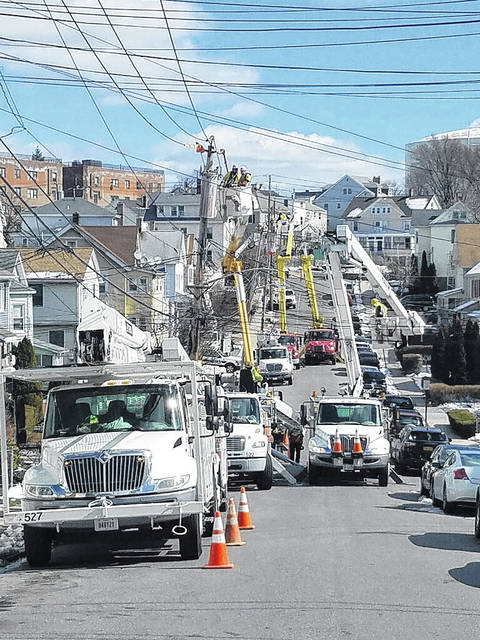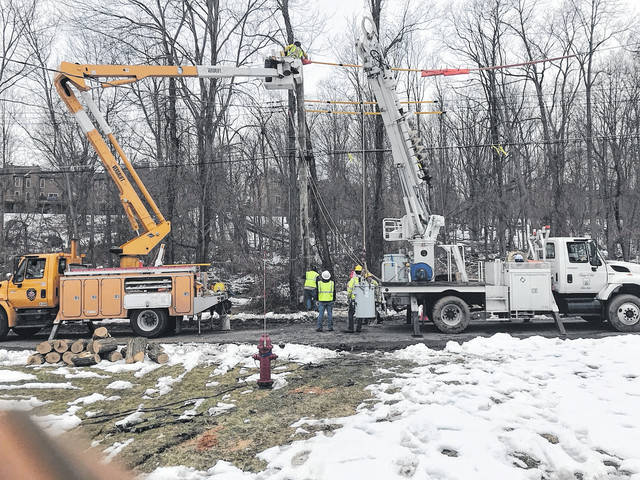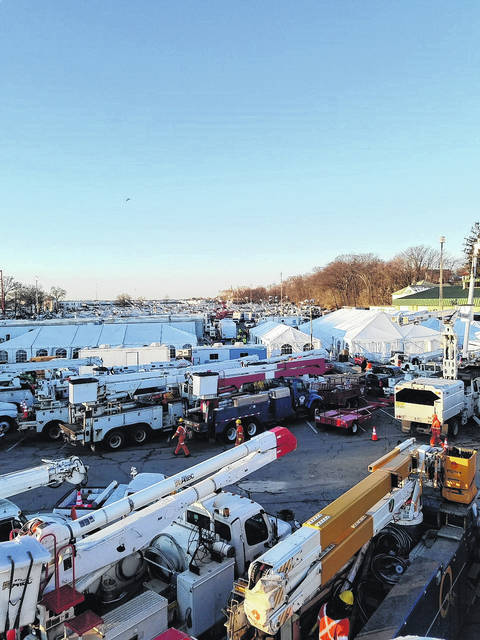


JACKSON CENTER — Tree buds are swelling, lawns are greening up and early flowers are showing off their vibrant colors confirming the arrival of spring; but it wasn’t that long ago that Old Man Winter was having his last laugh at the expense and disappointment of a great number of people living on and along the east coast of the United States.
A series of winter storms or macro-scale cyclones commonly called a Nor’easter’s hammered the east coast states from Maine to North Carolina and as far west as Ohio for three weeks in a row. Slowly spiraling in off the North Atlantic Ocean the storms brought howling-cold, relentless winds and devastation. First came freezing rain followed by heavy snow taking down trees and powerlines as it went. Thousands of homes, businesses, and municipalities were left without power for as long as two weeks until repairs could be made. Normally the local utility companies can deal with repairs but when large-scale damage occurs it’s time to rally the troops! All across the nation there is a network of overlapping utility regions that radiate outward from any given locality ensuring one area can assist another in times of natural disasters and other unforeseen problems that interrupt or stop normal power distribution. Most of the time weather-related issued can be handled locally but the magnitude of this weather pattern necessitated bringing in help from hundreds of mile away.
Early in the second week of March, Jackson Center Electrical Superintendent Dave Overman received a call from Bob Bowman with Piqua Public Power. Piqua was responding to a request for mutual aid to get the power lines up and working in the state of New York. Recent news coverage had painted a very bleak picture with many city streets being totally impassable due to downed trees, power lines and poles. Though a small village like Jackson Center has limited resources Overman had previously offered assistance in the form of manpower if a request ever came in for help. Bowman said they had an extra seat to fill in a bucket truck they were sending to help out in New York so without hesitation Overman said he would go. Besides providing assistance, it would give him valuable experience in how to respond to a similar situation at home should it ever come.
The night before leaving for New York lot of things were going through Overman’s mind. As he hurriedly prepared for the journey he prepared a checklist to make sure he was not forgetting anything. While most of the bigger tools and supplies needed to work in the field would be provided, Overman had to bring clothes, his own pole-climbing gear, safety harness, rubber gloves and his personal hand tools. Working outdoors in the elements can add an extra set of challenges to what is already dangerous working conditions so Overman wanted to be prepared for the worst. He packed plenty of heavy clothing to insure that he’d be able to stay warm in the long days he would be spending in the field. There would not be an opportunity to “run back to the shop” in the event they were not fully prepared.
Thursday, March 8, found Overman leaving Piqua at 6 a.m. They were heading for Rye, New York, and less than favorable weather conditions in Ohio added to an already long drive of approximately 15 hours. Upon arriving in New York, Overman and a host of others were brought up to date on what to expect and had to complete a focused training session to prepare them for the unique and dangerous challenges they would be facing the next morning. After a 19 hour day Overman was ready for some much-needed rest.
It seemed like no sooner than he had finally dozed off it was six o’clock a.m. and time to get up and go to the staging area where all the equipment and supplies necessary for the repair projects were assembled. The Staging area was only about ten minutes from the motel where the linemen were staying. Overman noted the whole operation was very organized.
“Regardless of where people were from, they all had previous training to work in an environment like that one. Back home in our neighborhood Jackson Center has an on-going working relationship with several municipalities like Piqua, Waynesfield, Lakeview, Tipp City, New Bremen, Minster, Wapakoneta and a host of other communities in our area,” said Overman. “Locally we belong to a joint agency; American Mutual Power or AMP. We all work together, train together, and have each other’s back in times of need but it doesn’t stop there. There is also a national mutual aid network composed of the smaller agencies like AMP that extends from coast to coast.
“The APPA or American Public Power Association has members everywhere and all are in agreement to assist each other should a situation arise that cannot be fully handled by local members. If the problem is too much to handle they just reach out further and further until all needs are met. This includes manpower, equipment and supplies; whatever it take to get the job done,” Overman said. “It’s pretty amazing really, it’s like one big family, and one you’re proud to be a part of. Yes the days were long, the work was hard, but we all pulled together until our list of things to do was finished. We worked from 6 a.m. until 10 p.m. only taking time out for a quick lunch and a couple of short breaks. We were supplied with coffee, soda, water and snacks for breaks but we were on our own for lunches.”
Though the days were long Overman said it was really rewarding when the repairs were finished and the power restored.
“When we first arrived we encountered a lot of grief; some of the people had been without power for over a week and were really on edge demanding to know how much longer it would be until power was restored,” said Overman. “Though pretty ticked-off at first, most settled right down when they learned how far we had traveled to help and how long our work-days were. We told them we were doing the best we could with what we had; thankfully things improved over time as more help and supplies were made available for repairs.”
Overman also noted he and some of the others were not prepared for the degree of damage he first encountered on the job.
“It was really a mess, you just can’t imagine something like that until you experience it first-hand. The first priority is safety, we had to make sure all the lines were dead and that no one had generators back-feeding into the system. Before wires could be spliced, repaired, or replaced we had to reset poles to hold them. Broken or crooked poles were dug or pulled out and new ones set. All the downed transformers were totally shot and unrepairable; they all were replaced as well. It was amazing to see how everyone worked so well together in a time of despair, there was an element of excitement in the air; even though the days were long, the time seemed to pass quickly.”
Ironically the bad weather conditions Overman prepared for were never realized.
“After the storms passed it was beautiful outside. Temperatures were in the mid-forties at worst and it was sunny most of the time. I didn’t end up using all the extra-warm clothing I brought but that was OK with me; the mild temperatures made the working conditions much more favorable.”
Overman said he grew accustomed to the daily routine quickly and before he knew it the week he was scheduled to work came and went and it was time to head back home on March 15.
Looking back Overman is very thankful he had the chance to participate in the mutual aid effort and help bring things back to order in the disaster area.
“Going to New York was a real eye opener, I really learned a lot and now know there is no classroom on earth that could totally prepare one for the conditions myself and countless others worked in; the opportunity was priceless! I also feel a lot more confident in respect to my ability to address a similar situation should it arise here and the level of service I can expect to receive from our mutual aid network if ever needed. It’s a great feeling to know you’re prepared and have help if you need it,” said Overman.
Jackson Center Village administrator Bruce Metz and Mayor Scott Klopfenstein both expressed their appreciation for having someone of Overman’s character and talent working in Jackson Center.
“We are extremely proud of Dave and thankful he made the trip there and back in one piece, one never know what challenges will arise in a situation like that” Klopfenstein said.
Metz agreed saying; “This also adds to Dave’s ability and expertise, it’s nice to know we have a top-notch electrical superintendent in Jackson Center who is ready to deal with the day-to-day duties as well as any extraordinary circumstances that may come our way. Hopefully we’ll never have a situation like they had in New York but if we do it’s nice to know we’re ready. Thanks Dave.”




